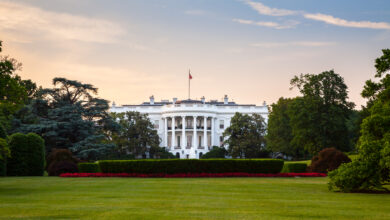Pompeo in Cairo; clueless and dangerous

Secretary of State Mike Pompeo went to Cairo ‘as an evangelical Christian’ – a weird self-designation I have not seen in almost 40 years of covering U.S. Secretaries of State – and gave a speech, reflecting not only the current poverty of America’s foreign policy, since the speech was bereft of any political ideas, but was also an abandonment of the American values of respect for basic rights and freedoms, good governance, legal accountability and political empowerment; values that are supposed to undergird U.S. foreign policy. As expected, Secretary Pompeo’s speech at the century old American University in Cairo was a pathetic paean to Arab autocracy at the very moment its brutal ascendancy against reformers, human rights activists and proponents of vibrant civil societies is near complete. Pompeo blurted 3596 words, but never uttered the phrase ‘human rights’, not even hinting at the need for accountable governance. But what was most stunning about the content of the speech was its unadulterated contempt for the intelligence, human agency and dignity of the peoples of the Middle East. Even his tone and body language were condescending to his audience.
In recent years, American officials established a pattern of going to Cairo to address Arabs and the Muslims of the world – not necessarily engaging them fully and consistently – about the weighty challenges facing them and what the U.S. can or should do to help ameliorate them. Former Secretary of State Condoleezza Rice, representing President George W. Bush, gave the first such speech in June 2005 urging Arab states to work for a democratic future, stressing that \”We are supporting the democratic aspirations of all peoples.\” In June 2009, President Barack Obama made the same political pilgrimage to Cairo and gave his famous “A New Beginning” speech. Obama spoke about grand themes; improving the deeply frayed relations among Western nations and Muslim lands, the need to confront “violent extremists” a potent minority among Muslims, and he called for establishing a Palestinian-Israeli peace and saying that the absence of a Palestinian state was \”intolerable\”. Obama called on Arab and Muslim nations to reflect “the will of the people”, called for religious freedom and respect for religious diversity, and spoke at length about the rights of girls and women and the need to respect women’s choices. He addressed the tension between the U.S. and Iran, particularly over Iran’s nuclear program and became the first American President to publicly acknowledge America’s role in the “overthrow of a democratically-elected Iranian government” in 1953. Finally Obama said that \”my country is prepared to move forward.”
Secretary Pompeo did not bring to Cairo such lofty ideals, because he lacks them and his President does not recognize them. In fact, Pompeo sought to desecrate and belittle Obama’s “gravely” misreading the challenge represented by Iran and its proxies as well as that of “radical Islamist terrorism” and his timidity in confronting it and calling it by its name. Obama’s failure led to the “dire” results that President Trump has been trying to reverse. Pompeo was channeling president Trump’s disdain for Obama, and his treatment of a former American President in a foreign land was undiplomatic, uncivil and obtuse. Some of President Obama’s policies in the Middle East were indeed flawed; he was weak in confronting Iran and Syria’s depredations, and he was timid (including in his Cairo speech) in challenging our “friends’” gross violations of human rights. In Syria Obama acted like a Hamlet, and his heart was not in any decision he made. And in 2009 he shockingly abandoned a peaceful Iranian uprising against the entrenched theocracy. His reluctance in confronting Assad’s war crimes, and Iran’s rampages in Syria and Iraq was in part animated by his almost obsession with reaching a nuclear deal with Tehran. To ensure the Arab Gulf states’ lukewarm support for this deal he reluctantly acquiesced and became complicit in their horrific war in Yemen.
But unlike Trump, Obama did not adopt and support unconditionally the worst instincts and the criminal policies pursuit by Arab autocrats and despots like President el-Sisi who is the most repressive and violent leader in modern Egyptian history, with tens of thousands of political prisoners languishing in his jails. Pompeo’s Department of State documents such incarcerations and the widespread use of torture against Islamists and non-Islamists. This is the man Pompeo was urging “to unleash the creative energy of Egypt’s people”, the same leader whose violent coup has accelerated Egypt’s decline as a once regional power, marginalizing it as a polity and as a culture. Egypt was more advanced and more opened politically and culturally 75 years ago. Pompeo the “evangelical Christian” who keeps a “Bible open on my desk to remind me of God and His Word, and The Truth” then proceeded to applaud el-Sisi’s fake efforts to promote religious freedom, without any reference to other basic freedoms and not a word about religious bigotry practiced or tolerated by Egypt and our other allies.
Pompeo’s speech which coincided with the one-hundredth day anniversary of the brutal killing and dismemberment of Jamal Khashoggi at Saudi Arabia’s consulate in Istanbul on orders from the Saudi royal court. Secretary Pompeo did not deign to urge, even in a pro-forma fashion, Saudi authorities claiming to investigate the murder that the U.S. expects and demands a transparent and honest investigation. In fact Pompeo’s speech was an endorsement of the domestic and regional policies of Mohammed Bin Salman, the man the CIA suspects of giving the orders to kill Mr. Khashoggi, by stressing America’s assistance to the Saudi led war in Yemen “as they take the lead in preventing an Iranian expansion that would be disastrous for world trade and regional security”. Saudi Arabia is crucial in president Trump’s “vision” of the Middle East in which he sees a growing alliance between the Saudi led Gulf coalition and Israel as necessary and sufficient condition for the success of the main purpose of his Secretary of State\’s Cairo speech that is to confront Iran. Pompeo deliberately avoided saying much about Saudi Arabia, notwithstanding the Crown Prince’s atrocious policies even by Saudi standards. Every Saudi monarch meddled in Yemen’s affairs, but only MBS, as the impetuous Prince is called, dared to wage a systematic war to destroy Yemen’s economy and consciously target its civilians. MBS has embarked on a domestic campaign of intimidation against reformers and even mild critics including incarcerating women activists and subjecting them to torture, including electrocution and sexual harassment, treatment women were never subjected to in the past. The war in Yemen, in which all combatants are violating international laws and human rights has seen the recruitment of children by the major combatants including recruiting Sudanese children by the Saudi coalition. During his last trip to the U.S. last Spring, MBS in a meeting with some Middle East scholars and policy makers broached the diabolical idea of arming a former Christian Lebanese militia (The Lebanese Forces) that was active in Lebanon’s Civil War as a potential proxy force in fighting Hezbollah, Iran’s major regional auxiliary militia. Even after the international uproar caused by the killing of Khashoggi, MBS did not exhibit any change in his belligerent behavior.
Pompeo did not bring to Cairo any ideas, proposals or initiatives to address the myriad of political and military problems plaguing the region or the internal economic and social ills fraying brittle states. But he brought an abundance of attitudes and indignations. He acted like an impatient drill Sergeant trying to recruit his coalition of Arab autocrats and Israeli hawks in confronting Iran, the source of ALL evil, and ills afflicting the countries of the region. Pompeo’s indignation about Iran’s regional rampages in Syria and Iraq does not hide the fact that for all of his and Trump’s tough rhetoric about Iran, one can see clearly through the dust and confusion that Trump’s recent talk about Syria has created, that this administration is on its way out of Syria militarily, and then Iran “can frankly do whatever they want “in Syria as the U.S. president said recently. Last year, the Trump administration failed to resolve a dispute between the central government in Iraq and the Kurdistan Regional Government which led to a military confrontation in which pro-Iranian militias raising Shiite flags worked in tandem with the Iraqi army defeating the Kurds, and thus deepening Iran’s influence in Iraq. So much for rolling back Iran’s regional ambitions. Now we are withdrawing from Syria, and once again America is betraying its allies in the fight against the “Islamic State”, leaving them flailing between two fires, a vengeful Turkish President and a sadistic Syrian president.
The most outrageous sentence in Pompeo’s meandering incoherent rant was this gem: “The nations of the Middle East will never enjoy security, achieve economic stability, or advance the dreams of their people if Iran’s revolutionary regime persists on its current course.” Of course, Iran is a repressive, atavistic theocracy that has been suffocating its people and wreaking havoc in the region for decades. Iran has saved Assad from defeat, it is prolonging the war in Yemen, it had created Shiite militias in Iraq as a parallel force to the state, and helped Hezbollah to take Lebanon as a hostage.
Iran has exacerbated the problems in some Arab states, but Iran did not create the cancer that has been ravaging the Arab body politics for years and decades from Morocco in the West to Yemen in the East. Iran is not responsible for the brutal and corrupt regimes in Algeria, Egypt, Saudi Arabia, Sudan, and Bahrain just to name a few. The modern states of Iraq and Syria were gutted mainly by the ruinous and chauvinistic Baa’th parties that produced the dictatorships of Saddam Hussein and the Assad dynasty. In my life time, four Arab despots either were declared war criminals or should have been: Omar al-Bashir (Sudan), Assad of Syria, Saddam Hussein and Muammar Gaddafi of Libya.
The Arab world was in a state of retreat politically, developmentally and even culturally long before the onset of the season of Arab uprisings eight years ago. Now under an ascendant Assad, Syria is a land of desolation and endless woes. Egept as the saying goes, will continue to muddle through, although the status quo can no longer be sustained. Algeria, ruled nominally by the 81 year old president Abdelaziz Bouteflika a man not in full control of his physical and mental capacities, is a country drifting into a deeper crisis or open military rule. Iraq, as a unitary state, is still brittle, and so far Iran and not the United States remains the outside country with most influence in Baghdad. Under MBS’ erratic rule, Saudi Arabia’s immediate future will remain rife with uncertainties and pitfalls. Yemen will continue to die slowly. Sudan is currently imploding. Lebanon is in deep political and economic crisis with no national will of its own. Tunisia, the only potential bright star in that universe of Arab darkness, was the only country that emerged from the ashes of the bloody uprisings freer than before. But given its admittedly fragile democracy, Tunisia is the only country that truly deserves our political and economic support. Astonishingly, Tunisia was totally and shamefully ignored by Pompeo in Cairo.
Secretary Pompeo, glossed over all of these structural problems in these majority Arab countries, ignored the depredations of the modern deep states in these ancient lands and civilizations, and told us that Iran is the one and only source of our agonies in the region. No, Mr. Pompeo, only responsible states based on accountable governance and genuine representations, along with serious international allies can check the nuclear ambitions and regional threats of this malevolent theocracy forcefully but rationally not hysterically. Mr. Pompeo, you came to Cairo and displayed a petulant attitude and condescension toward those who came to hear you. You uttered many words but said nothing of substance, and you will be forgotten before you come back to Washington. But in less than an hour you betrayed the ideals of America, and showed your contempt for the peoples of the region.
=======================================================
Hisham Melhem is a columnist for the Lebanese daily An-Nahar. Follow him on Twitter at: @hisham_melhem.




